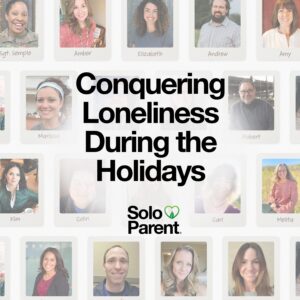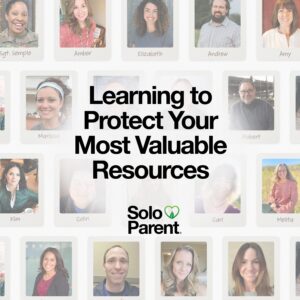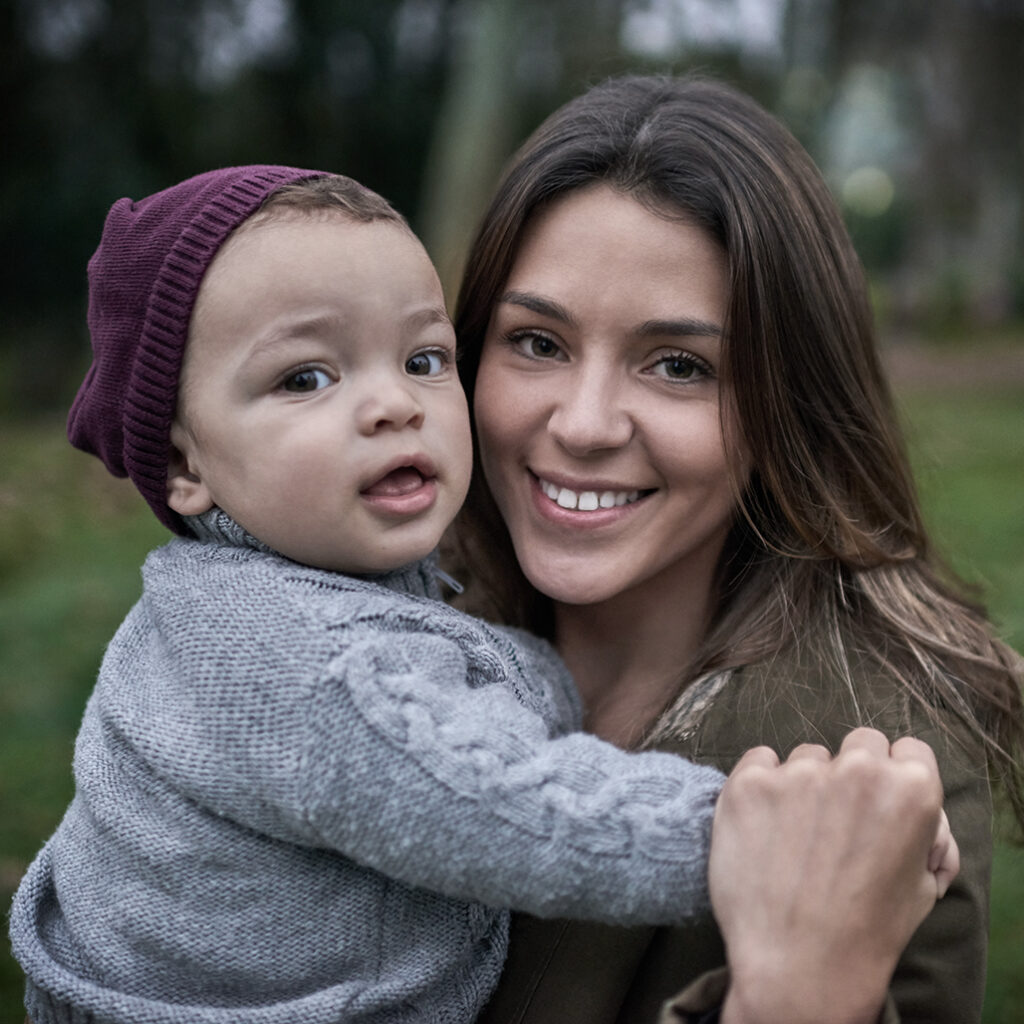All this month we’re playing clips from favorite episodes of 2024. Each week, a different member of our team will choose one episode to look back on, and we’ll talk about why it was one of their favorites.Today we are talking about one of Amber’s favorite episodes, Using Loneliness to Your Advantage with Dr. Chip Dodd.
Dr.Dodd is an author of one of our favorite books, The Voice of the Heart. He’s a speaker and a counselor. He holds a PhD in counseling and he and his book are cornerstone resources here at Solo Parent.
If there’s one word to describe single parenting, it would be loneliness. We are reminded throughout the day in big and small ways that we don’t have a partner for companionship. Loneliness hits when we miss our kids if we’re co-parenting. And we’re always keenly aware there’s not someone to share the responsibilities, the experiences, decision making and the mental load with, and certainly no one to laugh with or cry with after the kids go to bed. So how can we actually use that loneliness to our advantage?
I (Amber) am a big fan of Chip Dodd’s work with many of his books and his core emotions framework. loneliness is the hardest emotion for me. I am one of 11 kids, five brothers, five sisters. I grew up with people around me very often, and community is essential.
And what I love about this clip is how Dr. Dodd defines loneliness and how he talks about the idea that loneliness can actually be a gift because it helps us realize our need for connection.
[BEGIN CLIP]
What is loneliness?
For a lot of people, the words that people use instead of loneliness are words like restless, discomfited, not comfortable looking for something. Or, it makes me want to move, but I don’t know where to go.
Distraction is how many of us address it. We just keep busy to avoid it. But loneliness is really a gift. In its origin, it’s a painful gift because it’s a spur. It’s there to get me to actually move.
Loneliness is a feeling that says what is true and right about us. It’s a right feeling to have because it tells us we’re made to find fulfillment in relationship. It’s a relationship-oriented spur; a catalyst, a feeling that moves us toward something and toward ourselves to spend time in solitude. Solitude always leads to prayer. Prayer always leads to God, or just voicing out to the universe: What am I doing here?
Different people address certain levels of loneliness: the best friend, the spouse, the companion, the Solo Parent groups, which are fabulous because people walk out of those feeling “known” and understood. We can say, I’ve spoken about what’s happening in me and it wasn’t rejected. It was received and related to. The purpose of loneliness is to make us known to ourselves, to others, and to God.
Why do we feel so much shame about loneliness?
I (Chip Dodd) think it’s a toxic shame. There’s something wrong with me for being like this. It exposes our neediness, but it’s made to bring us into friendship: “into me see” is “intimacy.”
Neuroscience is late to the party; it’s saying what Voice of the Heart said and what ancient literature has been saying forever: humans find fulfillment through connection.
And it’s the inside of us connecting to the insides of others that makes us known. When we are seen, we are cared for. We are trusted. We belong. We matter. Neuroscience is catching up with the recognition that human beings find fulfillment through relationships; when my heart and my mind are connected to you and connected to God.
We don’t want to feel needy. We see that as a flaw. And that’s from our upbringing. A lot of people will say, “Hey, I’m just bored or I was just bored.” And “bored” is a word, an impaired expression, of not knowing how to name loneliness. So when a child says, “I’m bored.” That child is actually saying, “I’m lonely for something and I’m not sure what it is. Will you help me? Can you relate to me?” And if the parent doesn’t know how to address loneliness, they will both get stuck there, and all of a sudden they’re restless, irritable, and discontent.
When are we the most lonely?
I’ll go first (Elizabeth). It pops up at random times. The other day, I was running through my neighborhood down this greenway path that backs up to other people’s backyards, and I saw a little family—the husband and wife were sitting on their outdoor sofa. The kids were over playing with their outdoor play stuff and the parents were sitting there talking. There’s another house across the way. There’s a family inside. I can tell they’re rustling around. They’re cooking, they’re bringing stuff out to the grill. There’s a couple other family things happening here and there. I ran past a couple running together. It’s times like that when I notice what’s happening around me and notice what’s missing in my life.
For me (Robert), it was definitely at night because there was enough happening during my days—having three girls on my own. But when everything quieted down, then I realized that I was alone. And that was always the hardest time for me.
(Dr. Dodd) Feeling loneliness is vital. A lot of people might hear this and say, “Well then avoid it if it’s that terrible!” Even Aristotle said that a friend will double your joy and cut your sorrows in half. So, loneliness is there to take us to the right places. And we can benefit from it in the best ways and have the lives we were made to actually have. But if we don’t address it, it’s going to take us to places of avoidance, which is going to set us up and trap us in many ways.
Loneliness is not a condition that just comes with being a solo parent or being in a marriage that’s not working. It’s the nature of being alive in this life.
I (Dr. Dodd) want to emphasize the value and beauty of recovery groups.The best lunch I’ve ever had is when I split what I had with someone who didn’t have one. In other words, it became a relational feast. And when people take the risk of sharing with people who can then say, “I get it,” and they relate to it and tell their own stories, something happens. Even neuroscientifically, people walk away from those experiences fuller. The loneliness is there, but now you know what to do with it. You know where to go to be in the right place at the right time for the best benefit (versus distracting from it, which leads to regret).
If we don’t understand and know how to deal with our loneliness, and understand the gift of it, the advantage of it, then we contend to carry that loneliness into future relationships. And we think, “Well, if I just get married, then having another person occupy the same space is going to quench my loneliness.” And that’s not true. Sometimes you can feel more lonely.
I remember a poem I read years ago that said, “The loneliest place I’ve ever been is on 333 Elm Street with you in the next room.” It’s saying, “ I am alone even when I’m with you, which means you’re not willing to take me being known and receive you being known to me.” And that is a very, very lonely place.
Seeing Loneliness as a Gift
When two people are known to each other (when they have intimacy or “into me see”), there is a multiplication.There is synergy. Now one plus one is four. We get more out of our risk taking. But the gift of loneliness starts with admission, surrender, and accepting that I was made for relationship. And then accepting that, without relationship, I’m not going to be fulfilled.
Sometimes it’s me with God. Sometimes it’s me with me. Sometimes it’s me with you. But it’s essential to have to walk into the vulnerability to receive the gift. And almost everybody associates vulnerability with the next disaster, so we have to take a risk of hoping again, in spite of past experiences. We need to choose people who we can actually share our vulnerability with. [END CLIP]
Well, I (Amber) love how Dr. Dodd talks about loneliness as a gift that leads us to know what really matters most: our connection to people. We were made and designed to be in community. And I love that he mentions connection to God. One of the first things that we need to realize is that we’re made for community and communion with God.
One of the tips or strategies with loneliness is to begin our days with that awareness and starting there first, but also remember that throughout the day we need touch points and connection with those in our community. Then, at the end of the day, we again need that grounding anchor. Maybe it’s a quick text to a friend or maybe it’s prayer and connecting with God again. So, loneliness can be a gift in the way it signals us and points us to the fact that we were designed to connect with people.
Next, we’re going to listen to a clip about how apathy can happen when we’ve gotten really numbed out to our loneliness and maybe we’ve just kind of thrown up our hands and come to this place of just slogging through the busyness and being checked out to how deeply lonely we are. Maybe we’ve checked out of our recognition of our need for connection.
This can be a dangerous slide, because when we stop letting ourselves feel our loneliness, when we get numb to our need for connection, we can start to act in ways that bring hurt or harm to ourselves and others. Because if we’re like, “I’m lonely anyway, I guess it doesn’t matter if I follow up with that friend or if I respond to my church community group, they don’t care if I show up anyway” we can really begin to cause harm.
The Danger of Apathy
Loneliness is there to pull us in the relationship. Once we give up on how we’re made, or if we foreclose on hope or longing for a life where we matter and belong, we become cynical. It’s like we just resign ourselves over to it and think, “Don’t be a baby. Don’t let these things bother you.”
But loneliness has passion in it. Loneliness is a hunger for relationship. It’s a craving for fulfillment.But impaired loneliness, foreclosure on how our hearts are made, pulls us toward a territory called “going past feelings.” The Greek word for it is apathy. Paul admonishes us in Ephesians 4:17-19 to “not lose heart.” In other words, don’t wind up in that place where you go past feeling. Don’t lose your senses—because what waits for you there is apathy.
Apathy means: I don’t care. I remove myself from pain. And once you’re in apathy, you are being lured away into a place called isolation.
So, crying out is a blessing. People who “don’t do feelings” get sick—or people get sick of them. So the more we save ourselves through self-sufficiency and our capacity to be the fixer or the cynic,and the more we save ourselves from heart pain, the farther we get from the kind of life we were made for.
Loneliness is a doorway into fulfillment, and running from it is a doorway into isolation.
[END CLIP]
I (Amber) love how he describes the dangers of apathy. When we try to rely only on ourselves, it leads us further and further away from what we’re actually meant to have.
This is something that I (Robert) have struggled with in the past, and I’m really noticing how it was a coping mechanism that I developed early on in life. And to undo that takes so much, but really there’s no way for real connection if you just live in this state of self-reliance.
Loneliness was the number one thing that I (Elizabeth) dealt with, especially early on.
In time, I discovered the antidote to loneliness in my time with God, my time with myself, getting to know myself better, all of the things that Chip talks about. I was introduced to the Voice of the Heart unpacked that. Once I started meeting my loneliness in a healthy way, that fulfillment that comes out of that is almost like a drug. Where now, it’s like if I feel any sense of loneliness, I’m like, “Ooh, nope.” I know where to go. I know what to do. I know what’s needed in order to have that connection—so that I can be fulfilled again and pour out to my child, pour out to the people around me from a place of fulfillment and overflow.
So I would say, challenge yourself to feel what it’s like to step into loneliness and get it met in healthy ways–and I promise you won’t go back.
LISTENER QUESTION
“How can I still make our Christmas memorable without spending a lot of money and get my kids to be okay with it?”
This was tough, at the beginning, for me (Robert). We didn’t have a lot of extra money–and I was used to buying big gifts. So it was a real change for us.
But we just focused on what we had. I was honest with them. And you know what? We had great Christmases. This facade that we’re supposed to keep up with the Joneses—I think it’s important to call it what it is and say, “That would be awesome (maybe), but we’re going to have a good Christmas.”
When I (Amber) look back, I had a tendency to overcompensate and wanted my kids to have the biggest and the best presents. But that’s not what they remember. What they say to me now is, “Mom, are we still going to have a Polar Express hot chocolate party on Christmas Eve?” And you know what that costs? It costs a bag of marshmallows and some hot cocoa mix.
So maybe divert from the idea of presents and ask your kids, What activities and experiences have you loved most about Christmas? What about this time off from school? What kind of things do you want to do together? Make it more about the season and help them experience something beyond two hours on Christmas morning.
We love hearing from you. If you want to send in a question, go to our website and you will find instructions on how to email, call, or leave a voice message. You can also head over to Instagram or Facebook and send us a question there as well.




